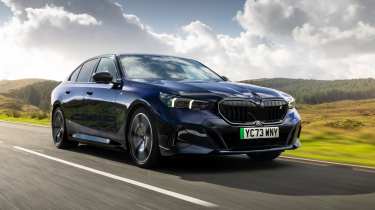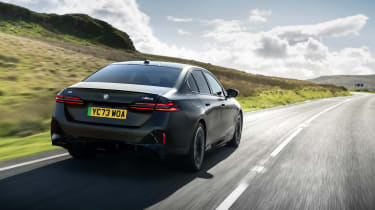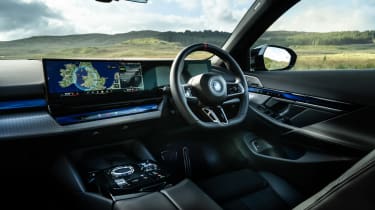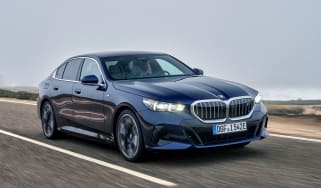BMW i5 M60 xDrive 2024 review – a glimpse into the future of M cars
The i5 M60 is an enormous technical achievement, but there isn’t much M magic to enjoy beyond its raw ability
Times are changing, and the age of the electric M car is upon us. Well, sort of. Before launching its first wave of fully-fledged battery-powered performance cars, BMW is testing the waters with a series of faster, sharpened up M Performance models, the latest of which is this: the i5 M60. Think of it as an M-lite, and a glimpse at what future electric M models have in store.
That a £97,745, 593bhp BMW saloon doesn’t warrant a proper M badge these days is slightly baffling, but that’s the world of high power EVs we live in. The i5 M60 achieves its output through a pair of electric motors (one on each axle), with peak torque rated at 605lb ft. A 0-62mph time of 3.8sec puts it firmly in supersaloon territory for pure performance, and BMW has applied detail engineering changes to make the i5 M60 feel and drive like a fast BMW should. That’s despite it weighing 2380kg, or more than two Alpine A110s…
The M60 rides on BMW’s Cluster Architecture and is currently the only i5 available with four-wheel drive (the base i5 uses a single 335bhp motor at the rear). Like other models there’s an 81.2kWh battery pack mounted in the floor, which offers up to 315 miles from a full charge. We saw 235 – albeit on a bitterly cold day with lots of motorway driving – but topping up from 10-80 per cent takes just half an hour thanks to 205kW charging capability.
More reviews
The battery serves as a structural support in the chassis, and the i5 M60 gets a front stiffening plate, adaptive dampers and rear-axle steering as standard. The full works of chassis gizmos is bundled with the £4000 M Adaptive Suspension Pro pack, offered exclusively with the M60 and fitted here. This drops the ride height by 5mm with an M-specific tune for the adaptive dampers, and includes active roll control to stiffen the anti-roll bars for extra support, or effectively decouple them to improve the ride. The system can even provide a counter-force to stop the body rocking from side to side over bumps.
That sounds fiendishly complex – and it is – but you don’t feel the electronics intruding on the move. What you do feel are the clean, accurate responses that have defined the best BMWs over the years; the i5 never feels overly bright or keen, but certainly more lithe than its 5 metre-plus length would have you believe. The rear-steer pivots the car into corners naturally, and you don’t necessarily need to apply less steering lock than you think; it all feels beautifully calibrated and quite serene.
The ride is exceptional in either of the two damper settings, Comfort and Sport. The i5’s platform stays flat and composed no matter what you throw at it, and filters out harshness beautifully – it’s hard to think of another rival that offers this level of suspension refinement. Big impacts are cushioned in Comfort and the i5 finds an easy flow, which doesn’t deteriorate when you switch to Sport for tighter vertical control. There isn’t an exaggerated effect between the two damper modes, or for the steering in fact; a sign that BMW is confident in the setup and it doesn’t need messing with.
The trouble is, all of this encourages you to drive the i5 gently, and not as you would a sports saloon. There really isn’t much information streaming through the chassis or the controls, and there’s too much luxury saloon-style squidge in the brake pedal to suggest that this is a true M product. As if to keep your mind on track, switching to Sport mode bathes the cabin in red and blue ambient lighting, with M graphics appearing on the dual-screen iDrive 8.5 infotainment display. The M-specific steering wheel, still way too thick, also has a rather naff looking red stripe in the 12 o’clock position, and the motorised seat bolsters pinch in to hold you at your kidneys. It’s quite a transformation, but no matter how it’s configured, the i5 M60 never morphs into a tactile or memorable car to drive.
That’s not to say it isn’t crushingly effective. The straight line speed it generates is mind-scrambling, and you need to be fully switched on and planning several steps ahead to get anywhere near full throttle. When you do there’s no build up, no drama, just brutal acceleration (you occasionally get a slight tug through the wheel as the front motor hooks up, but that’s about it). It’s quite a trick, but as with most EVs, there’s no means of interacting with the powertrain when you aren’t at warp drive. With its simulated petrol engine and paddle shifters, the Hyundai Ioniq 5 N proves that cleverly integrated software augmentation can make EVs more involving, and we hope future electric M cars offer something similar.
When the roads shrink in on the i5 it does feel big, but you can place it intuitively, build speed and dig deep into its abilities. It’s hard not to marvel at how it pulls grip from the surface – you can put huge demands on the chassis and it just keeps responding, turning in harder and finding immense traction. Get too greedy and the front end will scrub wide, but keep your entry speed in check, drive to the i5’s strengths and it’s a missile. Time it right and you can use the throttle to neutralise the car and energise the rear, but there isn’t much scope for adjustability or fun. It’s certainly not a typical M product in that sense, and besides the shock and awe factor, there isn’t much incentive to push the envelope.
That means you tend to drive the M60 like you would a standard i5 for most of the time, occasionally punching through the sound barrier for a shot of adrenaline. There just isn’t much to interact with, and it doesn’t feed your senses in any way beyond raw speed. That wasn’t the case with the old V8-engined M550i, which on top of the extra performance, offered a totally different character, noise and delivery to a 520i to make every journey more special. Being an EV, the M60’s powertrain can only amplify the sensations you get in a normal i5.
Does that mean it isn’t worth £97,745? Saying that feels cruel, because the M60 is brilliant in other respects and a great technical achievement. But it’s also proof that hot EVs need to offer a meaningful personality shift over and above the extra performance they offer. Hyundai cracked it with the Ioniq 5 N, and perhaps BMW will when it launches its first fully-fledged electric M car. But it hasn't here.






